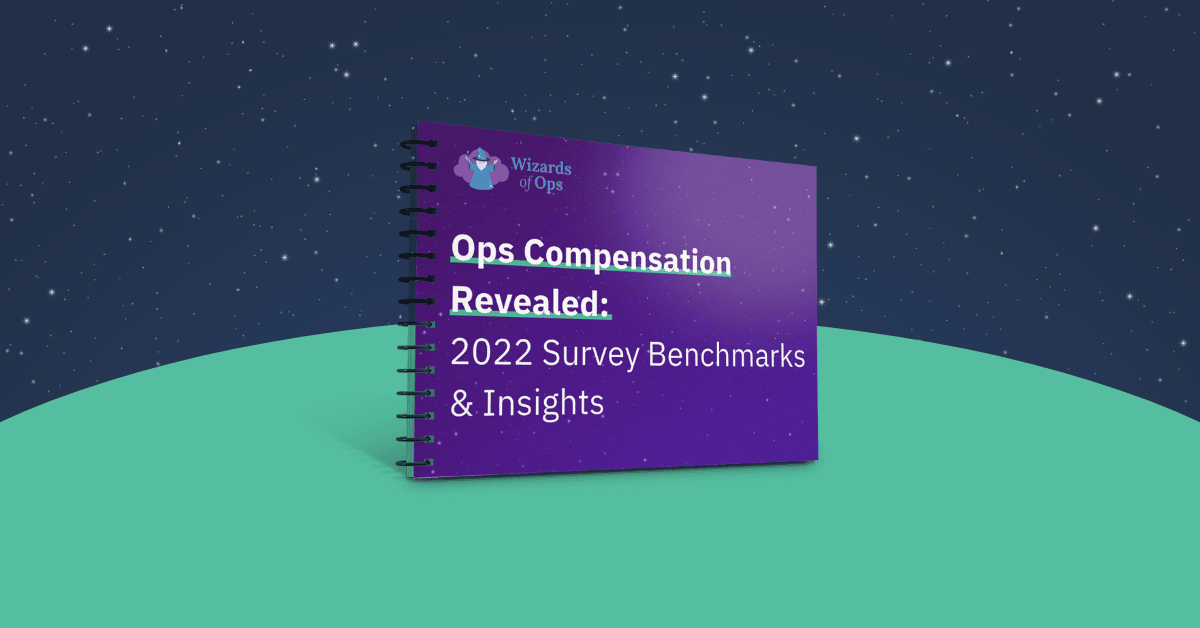Wizard of Ops, the leading sales and revenue operations-focused community recently conducted an industry survey to determine leading Ops compensation statistics for 2023.
With over 500 respondents represented across 26 countries and 37 states, the results highlighted salary standards, expectations and the key factors contributing to career satisfaction for these rapidly expanding roles.
So, whether you’re an Ops leader hoping to remain competitive in order to scoop up top talent, an admin benchmarking your salary, or a job seeker looking for the right opportunity, the insights in this report will help provide answers to your questions.
Check out the top operations compensation statistics for 2023:
RevOps roles are becoming more diversified
- About 54% of ops roles are held by males while 44% are held by females.
- Majority of ops respondents were between the ages of 30-39 (62%). The second growing age group working ops roles is 18-29 (24%) while the remaining 14% is made up of people over the age of 40.
- Ops teams are diversifying, with more dedicated roles for Sales, Marketing, and Revenue ops in addition to FinOps, CS Ops, and Business Systems.
GTM Ops primarily reports to a revenue lead
- Almost half of ops teams currently report to the revenue/sales lead at their organization.
- 24% of those polled reported into the broader operations org.
- 8% of ops teams report to the finance lead at their organization.
- While only about 5% of respondents reported into IT leadership, they represented some of larger businesses polled, highlighting that as these roles become more diverse, there may be a split in reporting between Revenue, IT and Finance.
RevOps teams are scaling faster
- Traditionally, ops teams have typically hired their first ops person when their organization reached around 50 employees. But according to the 2022 WizOps report, more than half of the participants with an organization of 51+ employees have 2-5 ops team members. This indicates that ops teams are growing faster than in the past.
2022’s average industry operations compensation fell between $126K-$150
- RevOps had the highest representation of those receiving >$150K (41%) followed by MOPs and BizOps at 27% and 24% respectively.
- On average Sales and marketing ops roles range from $76K-$150K.
- Salesforce admins are entering the workforce between $76-$100K, with more tenured admins averaging between $101K-$125K.
With seniority comes higher compensation across all ops roles
- Directory and C-Suite clocking in with 24% over $200K and more than half above $176K.
- Junior IC and entry-level positions drew between $51-100K (~$75K).
Ops salaries range by geography
- Texas (31 responses) skewed lowest for salaries in all samples, with 62% of senior ICs making between $76K-$100K compared to GA/NY averaging $101-$125K and CA at $126K-150K.
- For mid-level manager positions, CA, GA & MA all averaged $126K-$150K, while NY presented slightly higher at $151K-$175K.
Bonuses have become commonplace in ops comp structure
- 60% of ops positions have bonuses as a part of their comp structure.
- It was less likely for ICs and entry level roles to have this included (more task oriented and aligned with base comp/role expectations).
- Median bonus across all experience levels was $15K annual compared to average annual salary of $126-$150K ( approx. 10% of annual salary).
- A majority of respondents (65%) received stock as part of their compensation structure.
Ops professionals overall are satisfied with their compensation
- More than half of respondents (51.9%) were either satisfied or very satisfied with their salary.
- SF admins (56%) & Marketing ops (55%) feel most satisfied with comp, Business ops (57%) feels least satisfied.
- Leadership feels most satisfied while entry level roles are least satisfied.
Compensation is low on the list of reasons ops employees leave a job
- Most Ops employees leave due to a poor work environment (27.67%) or new career challenges (24.31%).
- Only 12% of Ops professionals leave a role due to compensation alone.
- Downsizing was the primary cause for job change in people over 40, accounting for 25% of 40-49 compared to the overall average of 12%.
- Career progression and work environment outranked compensation across every age range.
Who you know matters when looking for an Ops job
- 38% of respondents got their most recent job from personal networking.
- 27% of respondents found their most recent role from LinkedIn.
- 22% worked with a recruiter to find their current role.
Conclusion: Recruiting & Retaining Top Talent Will Be Key in 2023
The overarching story this report tells us is a positive one– overall, operations professionals are happy with their compensation. What’s more, they aren’t leaving their roles because of pay. Rather, they leave because of a lack of growth opportunities and poor culture. As an Ops leader, this is key information when it comes to recruiting and retaining top-tier talent.
A few actionable takeaways for leaders based on this survey:
→ Stay competitive: Ensure you’re budgeting within the thresholds benchmarked within this report.
→ Invest in their development: Your Ops teams are hungry to sharpen their skills. Start thinking about how you can build a more solid program to support development and growth for your Ops teams.
Snag a copy of the full 2022 Ops Compensation Report here.
Interested in joining our community of over 5,000+ Ops leaders? Apply to be a wizard here.




